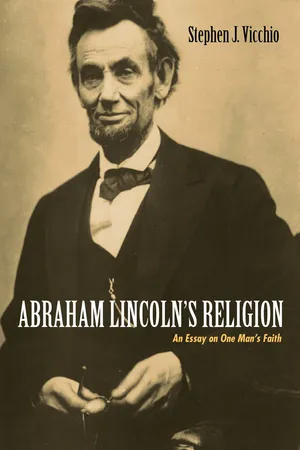![]()
chapter 1
The Role of Religion in Lincoln’s Early Life
It was a struggle with trees, logs and grubs.
—Abraham Lincoln, Autobiography
He was a good boy and never did anything disrespectful or disobedient to his mother.
—Sarah Bush Lincoln, Autobiography
He was surrounded by a class of people exceedingly liberal in matters of Religion
—William H. Herndon, Abraham Lincoln
The chief aim of this initial chapter of this work on Mr. Lincoln’s religion is to describe and discuss his earliest religious life, in Kentucky, then Indiana, and finally in Illinois. Additionally, in chapter 1 we also will describe and discuss the central beliefs of Mr. Lincoln’s family’s Separate Baptist faith. This will be followed by a description of the sect’s major beliefs, their scriptural support for those beliefs, as well as some remarks on the several churches to which the Lincoln family belonged and attended when the president was a boy.
Abraham Lincoln, the sixteenth and perhaps greatest president of the United States, was born in a log cabin in Hardin County, Kentucky, on February 12, 1809, the same day as the birth of Charles Darwin, in England. The boy Abraham was named after his paternal grandfather, and he was not given a middle name. Lincoln’s grandfather had been killed by Native Americans and the killing was witnessed by Abraham’s father, Thomas Lincoln. Thomas Lincoln was uneducated, as was the president’s mother, Nancy Hanks Lincoln, who is reported to have signed her name with an X.
When the Thomas Lincoln family was still in Kentucky, they belonged to the Separate Baptist church in Hardin. In 1807, the Little Mount Separate Baptist Church split from the South Fork Baptist Church over the issue of slave ownership. This rift is recorded in the minutes of the South Fork Church. At the time, the question of slavery was dividing many congregations as they disagreed over the matter in areas where the practice of slavery was prevalent.
The log structure of the Little Mount Meeting House, to which the Lincoln family belonged, stood three miles east of the Lincoln home and now five hundred yards west of current-day Leafdale community, off route 31 East in LaRue County, Kentucky. The structure was destroyed by a windstorm in 1909. While in Kentucky, the Lincolns were members of the anti-slavery faction of the Separate Baptists.
This affiliation and upbringing may account for Abraham Lincoln’s later statement that he made in a solemn letter to A. G. Hodges of Kentucky on April 4, 1864, when he wrote, “I am naturally anti-Slavery. If Slavery is not wrong, then nothing is wrong. I cannot remember when I did not so think, and feel.”
According to the 1811 census records of Hardin County, Kentucky, when Abraham Lincoln was two years old, and living at Knob Hill Creek, there were 1007 slaves and only 1627 White males over the age of sixteen living inside the boundaries of the county. It was against these slaves—wageless workers—that Thomas Lincoln, a carpenter, farmer, and laborer of the land, was forced to compete for a living.
The New Kentucky Composition of Hymns and Spiritual Songs, a collection of songs and musical compositions used by the Little Mount Meeting House, when the Lincolns lived on their farm on Knob Creek, in Kentucky, was the principal source for religious music in the early Separate Baptist churches. This hymnal was used by the anti-slavery group of the church. It was produced by the Gerard and Berry Printers of Frankfurt, Kentucky. The hymnal was published in 1816.
The minister of the Little Mount Separate Baptist Church was the Rev. William Downs. The clergyman, who was born in 1782, was the minister, teacher, Bible scholar, and musical composer for the congregation. The Rev. Downs baptized Thomas Lincoln when he joined the flock at Little Mount Separate Baptist Church.
As a young child, Abraham Lincoln must have heard readings from the “Neufchatel Bible,” printed in 1799, in England. The Neufchatel Bible was a version of the Geneva Bible. It was also the version of Scriptures purchased by Thomas Lincoln in 1819, when Abraham was ten years old. The Neufchatel Bible was named after Charles de Naufchatel, a French prelate who lived in the latter portion of the fifteenth century. At any rate, both the Little Mount Separate Baptist Congregation and the Thomas Lincoln family used a version of the Geneva Bible, while still in Kentucky.
After a land dispute over the title to his farm’s land in Kentucky, Thomas Lincoln moved his clan to Knob Creek Farm, eight miles to the north. In 1816, Thomas and Nancy Lincoln, their nine-year-old daughter, Sarah, and their seven-year-old son, Abraham, moved to Indiana, where they settled in Hurricane township, in Perry County. Their land was part of what was to become Spencer County, Indiana.
Abraham Lincoln then spent his formative years, from the age of seven until twenty-one, on this family farm in Indiana. As was common at the time in Midwest America, Mr. Lincoln received a meager education, an aggregate of which was a little more than a full year altogether.
At the age of nine, Lincoln was instructed by Mr. Zachariah Riney for two months in the fall of 1815, when Mr. Lincoln was six years old. The following Autumn, another circuit teacher, Caleb Hazel, taught Abe and his sister for another three months. In 1822, when Lincoln was then thirteen years old, a third itinerate teacher named James Swaney instructed the Lincoln children for ninety days; and two years later, for a period of three months, Lincoln was taught by Azel W. Dorsey, another travelling teacher. These eleven months are the sum total of Abraham Lincoln’s formal education, with the exception of tutelag under William Mentor Graham for six months in the New Salem period of the sixteenth president’s life. More will be said about Mr. Graham, and his frontier school, subsequently in this essay.
In one of his autobiographical essays, Mr....
